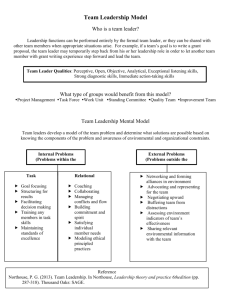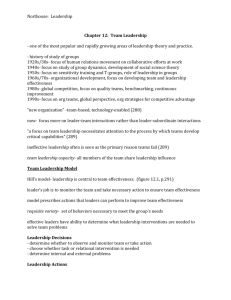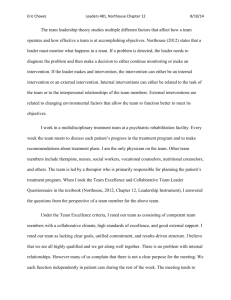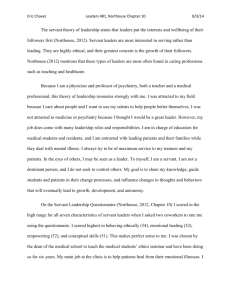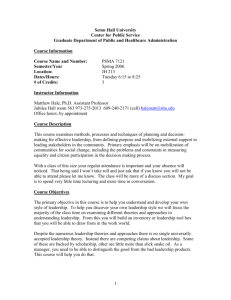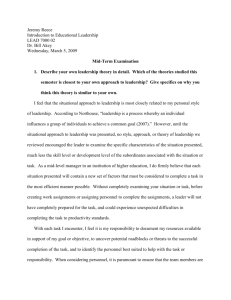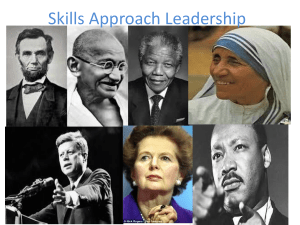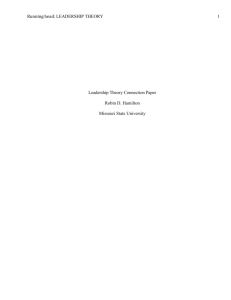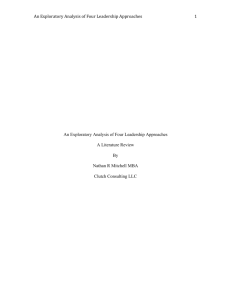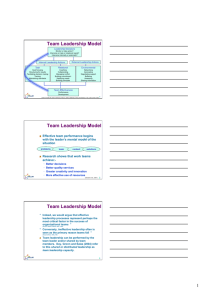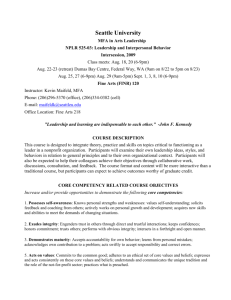Emily England-Reflection of Personal Leadership
advertisement
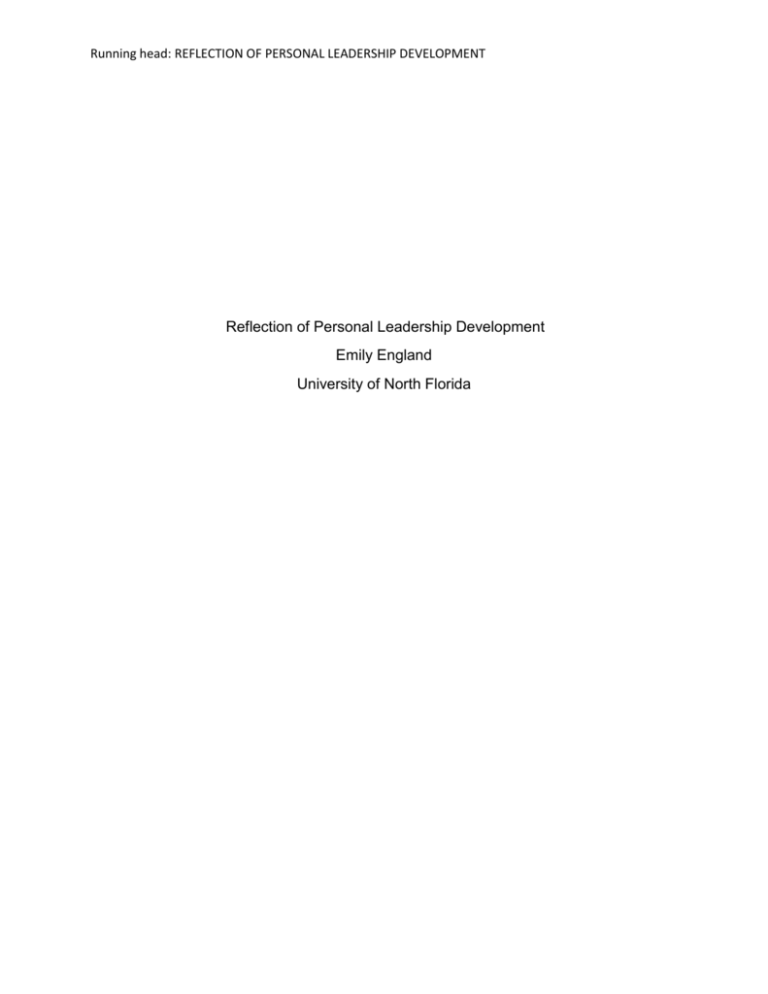
Running head: REFLECTION OF PERSONAL LEADERSHIP DEVELOPMENT Reflection of Personal Leadership Development Emily England University of North Florida REFLECTION OF PERSONAL LEADERSHIP DEVELOPMENT 2 The Introduction to Leadership class at the University of North Florida has opened my eyes to the complexity of leadership as well as my own potential as current and future leader. Since arriving to college, I have had countless opportunities to demonstrate leadership. These opportunities include, but are not limited to, my involvement in my sorority, UNF, and the Jacksonville community. I plan on becoming an elementary school teacher which will demand effective leadership. Through this course thus far, I have watched myself evolve as a leader by embracing my strengths and working on improving in my areas of weakness. The Self-Assessment Leadership Questionnaires were particularly helpful for identifying my strengths and weaknesses. One of the first questionnaires I completed was about skills. The questionnaire measures three types of leadership skills: technical, human, and conceptual. I scored the highest in the human skill category. Human skill is defined as “knowledge about and the ability to work with people.” (Northouse, p. 44). I was not surprised that I scored high in this category due to the fact that I am very much a people-person. In my sorority especially, I often work in team-settings which require me to work closely with my sorority sisters. For example, I am a part of the ritual crew that is in charge of preparing for formal chapters and initiations. As a part of this crew, I have to work with the other members to assign duties and collaborate ideas. Whereas I scored high for the human skill category, my lowest scoring category was technical skills. Technical skill is defined as “knowledge about and proficiency in a specific type of work or activity.” (Northouse, p. 44) It also includes “competencies in a specialized area, analytical ability, and the ability to use appropriate tools and techniques.” (Northouse, p.44). I have not had many opportunities to work on technical skills in the REFLECTION OF PERSONAL LEADERSHIP DEVELOPMENT 3 past; however, a skill that I have been striving to improve that could be considered a technical skill is my proficiency with programs like Word, Powerpoint, and Excel. As I’ve progressed as a college student it has become necessary to work with these programs often and to be able to use them in a variety of ways. Proficiency in programs such as these will be helpful when I become a teacher. Another Self-Assessment Questionnaire that was helpful in identifying myself as a leader was the Authentic Leadership Self-Assessment Questionnaire. This questionnaire lists statements about the different dimensions of authentic leadership and the reader must rate how much they feel the statement reflects themselves. The dimensions are self-awareness, internalized moral perspective, balanced processing, and relational transparency. I scored very high in the relational transparency section. Relational transparency refers to “being open and honest in presenting one’s true self to others.” (Northouse, p. 264). I scored high in this section because being honest is a strength of mine. I also scored the highest in the internalized moral perspective category. Internalized moral perspective category refers to “a self-regulatory process whereby individuals use their internal moral standards and values to guide their behavior rather than allow outside pressures to control them.” (Northouse, p. 264). I have always had strong morals and the ability to not be influenced by any negative peer pressures so scoring high in this category was expected. What was not expected however was scoring low in the self-awareness section. Self-awareness refers to the process of an individual understanding themselves. (Northouse, p.264). Before taking this assessment I thought I understood myself pretty well, but I had trouble with the statements regarding self-awareness, such as, “I can list my three greatest strengths,” REFLECTION OF PERSONAL LEADERSHIP DEVELOPMENT 4 and “I can list my three greatest weaknesses.” (Northouse, p. 280). By taking questionnaires such as this, I can help become more self-aware by interpreting my scores as a means of identifying my strengths and weaknesses. For instance, discovering that self-awareness is a weakness of mine has ironically helped me become more self-aware. I scored neither low nor high for the balanced processing category. Balanced processing is “an individual’s ability to analyze information objectively and explore other people’s opinions before making a decision.” (Northouse, p.264) While this is not exactly a weakness, more often I have been asking for input from my peers in team situations to complete assignments like group projects. An essential factor to effective leadership is integrity. I discovered in the previous questionnaire that being ethical was a strength of mine in relation to authentic leadership. The final questionnaire in Peter Northouse’s Leadership reaffirmed strong ethics as a strength of mine. The Perceived Leader Integrity Scale lists statements in which the reader agrees with them on a scale of one to four. The lower the score, the more ethical the person is that is taking the test. I scored a 31 which put me in the high ethical category. I embrace this strength when I find myself in positions of leadership. For instance, in my sorority I encourage my sisters to live ethically and uphold our values as stated in our bylaws. I also strive to serve as a good role model by upholding these values myself and always behaving ethically. Through this course I have had the opportunity to take the Myers-Briggs Type Indicator test. This test can produce 16 different results. It determines extraversion versus introversion, sensing versus intuiting, thinking versus feeling, and judging versus perceiving. I have completed this test twice and both times I received the result ENFJ. REFLECTION OF PERSONAL LEADERSHIP DEVELOPMENT 5 The “E” indicates that I am an extravert. Extraversion is “a preference for obtaining information, inspiration, and energy from outside one’s self.” (Northouse, p.331). As a result of me being an extravert I have strengths when it comes to social situations and public speaking. The “N” refers to Intuition. People who are intuitive “prefer to be creative, fantasize about the future, and to apply ingenuity to problems.” (Northouse, p.332). Creativity, in particular, is a major strength of mine that I use in my daily life and often apply to problems. The “F” refers to feeling. Feelers often “seek harmony with others and take account the feelings of other people.” (Northouse, p.333). Since my human skills are a strength of mine, this result makes sense. In order to accomplish a task I always make sure the group is in harmony and everyone is happy. The “J” refers to judging. “Judgers prefer structure, plans, schedules and resolution.” (Northouse, p.333) This result is accurate to me because I often make plans far in advance and rely on a daily schedule. My Myers-Briggs result closely mirrors my personality and helps me understand myself as both an individual and a leader. Through this course I have come to think of myself as a leader and see my potential for successful leadership in the future. Peter Northouse’s Leadership has provided me with numerous opportunities to explore my strengths and weaknesses through its Self-Assessment Leadership Questionnaires. I am currently working to improve on my weaknesses, such as my lack of technical skills and self-awareness. More importantly, I am embracing my strengths of creativity, integrity, and my ability to relate to people. If I continue to do this I will continue to evolve and improve as a current leader among my peers and a future leader to my students. REFLECTION OF PERSONAL LEADERSHIP DEVELOPMENT 6 References Northouse, P.G. (2013). Leadership: Theory and Practice. California: SAGE Publication INC.
